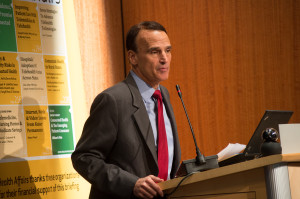How Community-Clinic Integration is Boosting Population Health — Part 2
When community organizations collaborate, change happens. Earmarked as one of the next frontiers in public health, community-clinic integration strengthens the…
When community organizations collaborate, change happens. Earmarked as one of the next frontiers in public health, community-clinic integration strengthens the…
Communities play a critical role in shaping Total Health. Too often, the ability to lead a healthy life is stymied…
This week, the NO MORE campaign against domestic violence and sexual assault is celebrating its first anniversary. The public awareness…
We’ve captured the buzz and analysis of yesterday's health track sessions at South by Southwest in this info graphic, one…
Today was a busy day at the Center for Total Health. We were excited to welcome a range of guests…
This post is part of a campaign to invite feedback and ideas that will help inform the next generation of content for…

“Connected care” is gaining more momentum in the health care industry. Health care providers are adopting electronic health records with federal support and standard setting. Consumer electronics makers and applications developers are offering more tools and devices for consumers to track and manage their health. Patients have more options for accessing care and information, and communicating with care teams.
On February 4 in Washington, DC, Dr. Robert Pearl, CEO of The Permanente Medical Group, shared Kaiser Permanente’s experience as a leader bringing electronic tools to its 3.4 million Northern California members in a discussion sponsored by the journal Health Affairs. Here is Dr. Pearl’s article in the recent issue and a video recording of the event and slides.
Dr. Pearl shared his optimism that health care is poised to be transformed by electronic technology in ways similar to the retail, travel, and finance sectors. He also noted some barriers in the way, including a predominantly “fee-for-service” payment model that fails to incentivize non face-to-face care or investments in information systems geared to prevention and care coordination. “We can’t just lay technology on the current system,” Dr. Pearl noted. He cited new payment models such as ACOs, the growing popularity of Medicare Advantage and its “5 Stars” quality incentives, and hospital readmission penalties as all providing momentum for changing behavior of physicians and other parts of the health care system.
Community innovators across the landscape of total health met yesterday at the Center for Total Health's February Community Tour. Attendees…
A recent discussion paper, presented by participants of the Institute of Medicine Evidence Communication Innovation Collaborative (ECIC), found that 94 percent of U.S. adult social media users with health conditions agreed with the use of their health data – shared anonymously – to help clinicians improve care. ECIC is co-chaired by Bill Novelli and Kaiser Permanente’s former CEO, George Halvorson.
The report found that the vast majority of U.S. adult social media users with health conditions strongly endorse sharing their health data anonymously to help improve care they and future patients receive, as well as to strengthen health care. The paper titled, Social Networking Sites and the Continuously Learning Health System: A Survey, was released today by The Institute of Medicine (IOM).
For more on this story, click the ‘Read More’ button below.